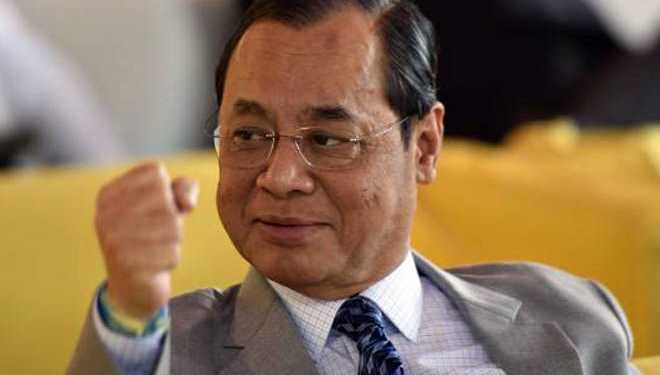Newly appointed Chief Justice of India- Ranjan Gogoi- is famous for his strict nature and judgments. In his very first speech as CJI in the Supreme Court, he spoke about his commitment to improve the judicial process. The CJI had said, “We are trying to reduce the time between filing and listing of cases. We are trying to introduce a system by which the cases will not be dropped from the list. If we succeed, a large segment of mentioning would go away.” He also mentioned about his strict nature. CJI said, “I am told that I am a strict man. I am what I am I can’t change that.”
So far, CJI Ranjan Gogoi has shown through his actions that his words were not just mere lip service to the cause but a driven effort to make the judiciary more efficient. With his first few decisions, he has shown that he is fully dedicated to bringing in reforms in the judiciary. One of the most common criticisms of Indian judiciary is that it is marked by long delays, the legal system is slow and cases take forever to solve. It has been seen, in many cases that by the time the final judgment is delivered, the victim, accuser and/or convict might have already passed away. The precious time of judiciary also gets wasted in what can be termed as ‘unnecessary leaves’ by the judges. It leads to pile-up of more and more cases. As President RamanathKovind had pointed out earlier, “There is a backlog of 3.3 crore cases in various courts of the country. Of these, 2.84 crore cases are in the subordinate courts. Another 43 lakh are in the High Courts and about 58,000 in the Supreme Court.”
CJI Ranjan Gogoi from the very start has made it crystal clear that lethargy would not be tolerated. On his very first day in the Supreme Court, CJI Ranjan Gogoi made an impressive announcement of putting an end to the morning ritual of ‘mentioning’. He said that ‘mentioning’ exercise would be done only in exceptional cases by the advocates on records or their junior associates. CJI Ranjan Gogoi was quoted as saying, “No mentioning! We are working out the parameters… if someone is being released today, then yes… if someone is being hanged today, then yes… if somebody is being evicted today, then yes… if there is risk of demolition, yes….beyond that, No!” The ritual of ‘mentioning’ had become a tool in the hands of senior lawyers to bully junior advocates. It has been used to abuse the process of law. Plus the ritual of ‘mentioning’ is time consuming which takes up about 15-20 minutes precious time of the apex court each day. Having said it all, it is indeed a welcome step by the newly appointed Chief Justice of India.
Now, Ranjan Gogoi has come up with several other steps to ameliorate legal process and to make courts more efficient. According to the reports from The Telegraph, the CJI held a video talk with the High Court chief justices during which he asked all judges to maintain punctuality, abstain from taking unnecessary leaves, and always be available in courts during working hours. He also barred the judges from taking LTC during the working days.
According to the Times of India report, CJI Ranjan Gogoi also frowned on them for attending seminars or official functions on working days as these activities encroach into the time to prepare for cases scheduled for the hearing next day. Chief Justice Gogoi also asked High Court chief justices to speed up the process of recommending names for the appointment of high court judges. Currently, more than 400 of the 1,079 judges’ posts in the high courts across the country are lying vacant. In order to quickly wrap up the pending criminal cases, the CJI has also decided to schedule the hearing of criminal matters on every Wednesday and Thursday before at least five benches of the Supreme Court. Many cases of murder, rape, kidnapping etc are pending in the apex court for the past one decade.
The CJI has also asked High. Court chief justices to inform the Supreme Court about the judges who are not following the new work discipline and he has promised that the Supreme Court will deal with them individually and strictly. Along with these orders he has also given advice on how to deal with corruption and malpractices in judiciary, he asked High Court chief justices not to “hesitate in withdrawing judicial work from judges who are under a cloud.”
According to the Hindustan Times report, the CJI also stressed the need to appoint advocates who have high income as judges, as it will prevent them from being tempted by money.These are welcome reform and a step towards solving the problem of pendency. It is good to see that the CJI Gogoi is recognizing the problem and is working to solve them with gusto, great signs for India and judiciary indeed.
Chief Justice Gogoi gets to work.
1. No leaves during working days.
2. LTC only during the vacation
3. No seminars during workdays
4. Daily monitoring of tendency
5. Identifying infructuous caseshttps://t.co/YGE6uoXYBf— Dr Kiran Kumar Karlapu (@scarysouthpaw) October 12, 2018



























